Are you a lawyer looking to enhance your online presence and attract more clients? If so, then you should consider running Law Firm PPC ads.
We live in an age where a strong online presence is essential. Marketing has transformed significantly, and simply being good at your work is no longer sufficient. To succeed in today’s oversaturated market, you must also be a master at online marketing for your law firm, utilizing pay-per-click (PPC) as a key strategy in your marketing efforts.
Just as spacecraft need precise navigation, your law firm requires a strategic law firm PPC campaign to stand out online. We’ll help you create successful campaigns, identify key terms, and implement tailored strategies. We’ll also cover SEO for lawyers, branding, and advertising rules. Use Google Ads for A/B testing to refine your campaigns and enhance your online presence with PPC for lawyers.
What is PPC for Lawyers?
Pay per click ads is an online advertising model where businesses pay for each ad click, optimizing budgets to attract clients. A law firm’s PPC strategy involves bidding on legal keywords to display ads in search results, incurring costs only when clicked. Effective, pay per click, campaigns require keyword bidding, monitoring, and dedicated landing pages to enhance visibility and client acquisition.
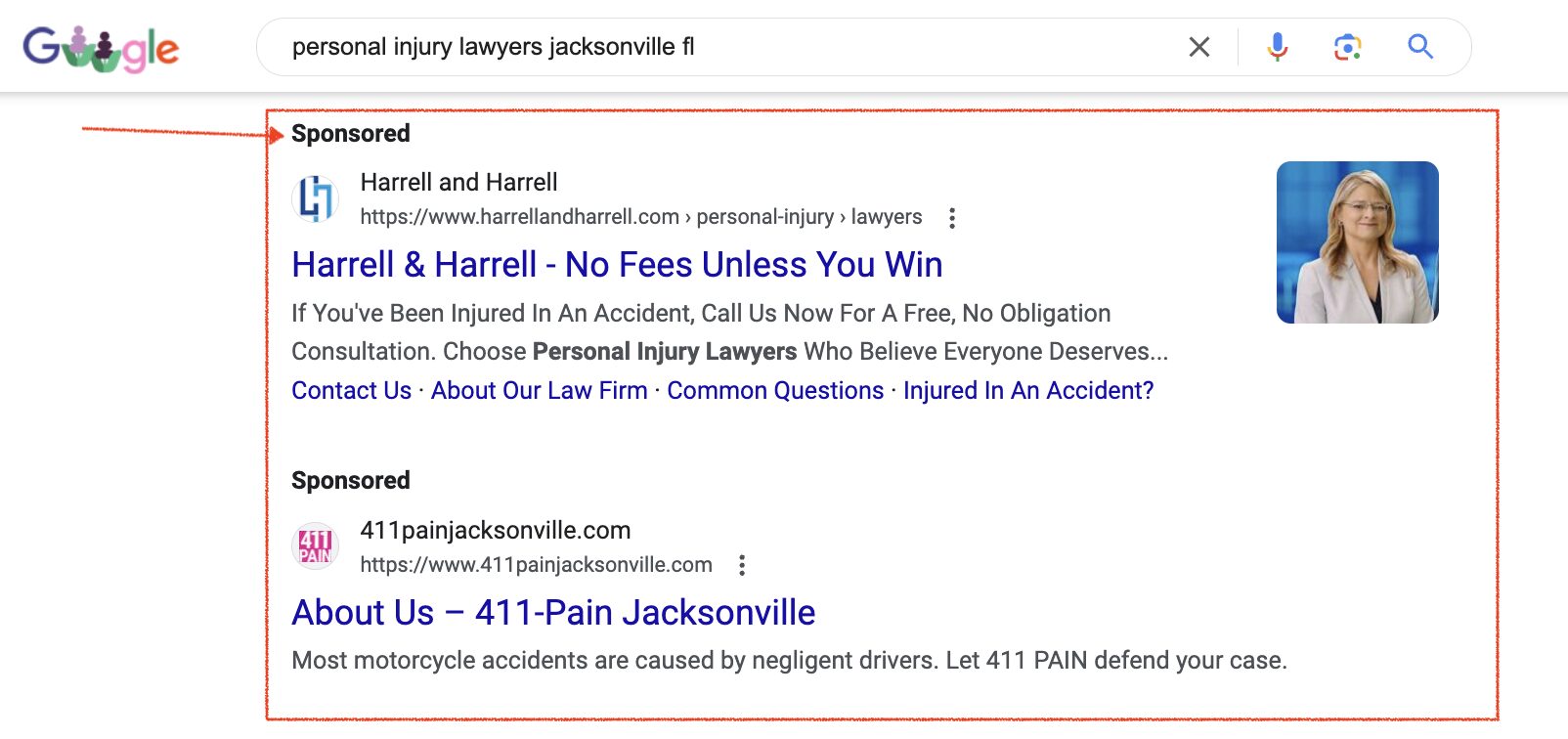
Lawyer Advertising Rules
Are lawyers allowed to advertise?
Lawyers can advertise their services but must adhere to legal and ethical guidelines, as outlined in the American Bar Association’s Rule 7.2. Understanding these rules is essential for effective pay-per-click advertising, ensuring compliance while attracting clients.Is Pay Per Click Advertising Worth While for Lawyers?
Pay-per-click (PPC) advertising can be valuable for lawyers, but only if done correctly. Building an effective google ad campaign is crucial, as it involves creating multiple ad variations, utilizing tools like Google’s Ad Preview, and conducting targeted keyword research. Because many factors are involved in running successful PPC campaigns, we recommend that lawyers hire a digital marketing agency specializing in Google Ads for Lawyers.
Case Study: PPC for Lawyers
We launched a law firm’s PPC campaign on Google Ads for Bernhardt Phillips, LLP, a new law firm in Indianapolis, IN, specializing in family law, divorce, estate planning, trusts, and wills, which had great results in a month.
Google Ads Performance Overview

Google Ads Campaign Performance Table
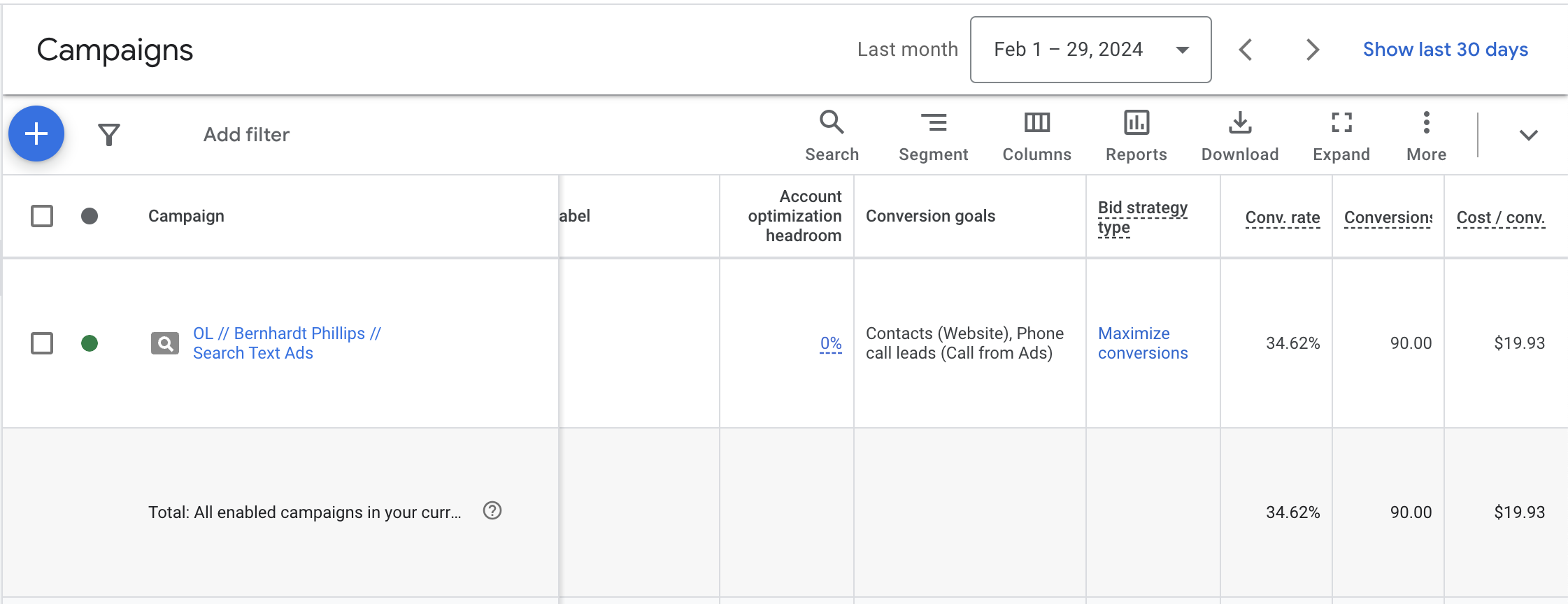
Bernhardt Phillips, LLP attained a 34.62% conversion rate at $19.93 per conversion using the “Maximize Conversions” strategy in Google Ads. This case study demonstrates PPC’s effectiveness for law firms, emphasizing targeted keywords, client attraction, budget control, and real-time campaign optimization.
Advantages of PPC for Lawyers
Incorporating PPC campaigns into your law firm’s marketing strategy can significantly boost your online presence. Here’s how:
Targeted Reach
Precise Keyword Targeting: PPC allows you to bid on legal keywords, ensuring your ads reach potential clients actively searching for your services.
Demographic Targeting: Customize ads to reach specific demographics, such as location and age, to attract the most relevant audience.
Immediate Visibility
Top Placement: Achieve immediate visibility at the top of search engine results, positioning your law firm prominently.
Quality Traffic: Draw high-quality traffic to your website, increasing the likelihood of converting visitors into clients.
Measurable Results
Comprehensive Tracking: PPC campaigns offer detailed tracking of key metrics, enabling performance analysis and ad optimization.
Budget Control: Set spending limits that align with your marketing strategy to maximize ROI.
By implementing effective PPC strategies, lawyers can gain immediate visibility, attract quality leads, and achieve a positive ROI, enhancing their digital marketing success.
Enhanced Online Presence
Increased Visibility: Maximize your law firm’s online reach by appearing in front of a targeted audience ready to engage with your services.
Lead Generation: Quickly generate new leads, helping your firm grow and succeed in a competitive market.
Optimize your PPC strategies for maximum growth and success in the digital landscape.
PPC vs. SEO for Lawyers: Fast Results with PPC Advertising
Paid advertising, especially through Google Ads, offers lawyers a fast online marketing solution, yielding quicker results than search engine optimization (SEO). By targeting keywords and demographics, firms can achieve top search engine rankings. Combining PPC with SEO techniques enhances campaigns, improving ad relevance and quality scores, ultimately maximizing digital presence and client attraction.
Types of PPC for Lawyers Ads
Paid advertising is crucial in driving online visibility and attracting new clients for law firms. The power of PPC for law firms lies in its versatility and the various ad formats that can be employed. Let’s explore the different types of PPC ads that can launch your law firm’s ppc campaigns to new heights in the digital universe.
Here’s a breakdown of the key types of PPC for lawyers:
Google Ads: Leverage specific keywords to appear at the top of search engine results pages, capturing the attention of users actively seeking legal services. Appeal to their needs and position yourself as the go-to expert. These ads are like guiding stars, directing clients to your website.
Display Ads: Utilize visually appealing ads on relevant websites to enhance brand awareness and attract interest from potential new clients, even those not actively seeking legal help.
Local Service Ads (LSAs): These ads target local businesses, ensuring your law firm appears prominently in local search results, increasing visibility to nearby clients.
Video Ads: Capture attention with engaging video content shown before or during online videos, boosting brand recognition and client interest.
Remarketing Ads: Reconnect with previous website visitors by reminding them of your services as they navigate the digital space.
Social Media Ads: Maximize reach by targeting platforms like Facebook Ads, Instagram Ads, and LinkedIn Ads, tailoring ads to your ideal audience to effectively promote your legal services.
Lawyers can boost their PPC advertising by targeting search ads for clients seeking legal services, using relevant keywords and optimized ad copy. Effective SEO and display advertising with engaging visuals on websites and social media can enhance brand awareness among potential clients.
Retargeting/Remarketing for law firms
Retargeting ads/remarketing ads are crucial for the success of PPC for lawyers. They help maintain a lasting impression on prospective clients by targeting users interested in your law firm.
This approach reinforces your brand, ignites awareness, and prompts users to contact your firm. Create compelling ad copy and visually captivating content to drive engagement and clicks.
Google Local Services Ads (LSAs)
Google Local Services Ads (LSAs) are pay-per-lead ads for local businesses, including law firms. They appear at the top of Google search results and outperform traditional paid ads.
LSAs highlight the firm’s name, phone number, and client reviews. By targeting users actively seeking legal services locally, LSAs deliver excellent search results even for lawyers.
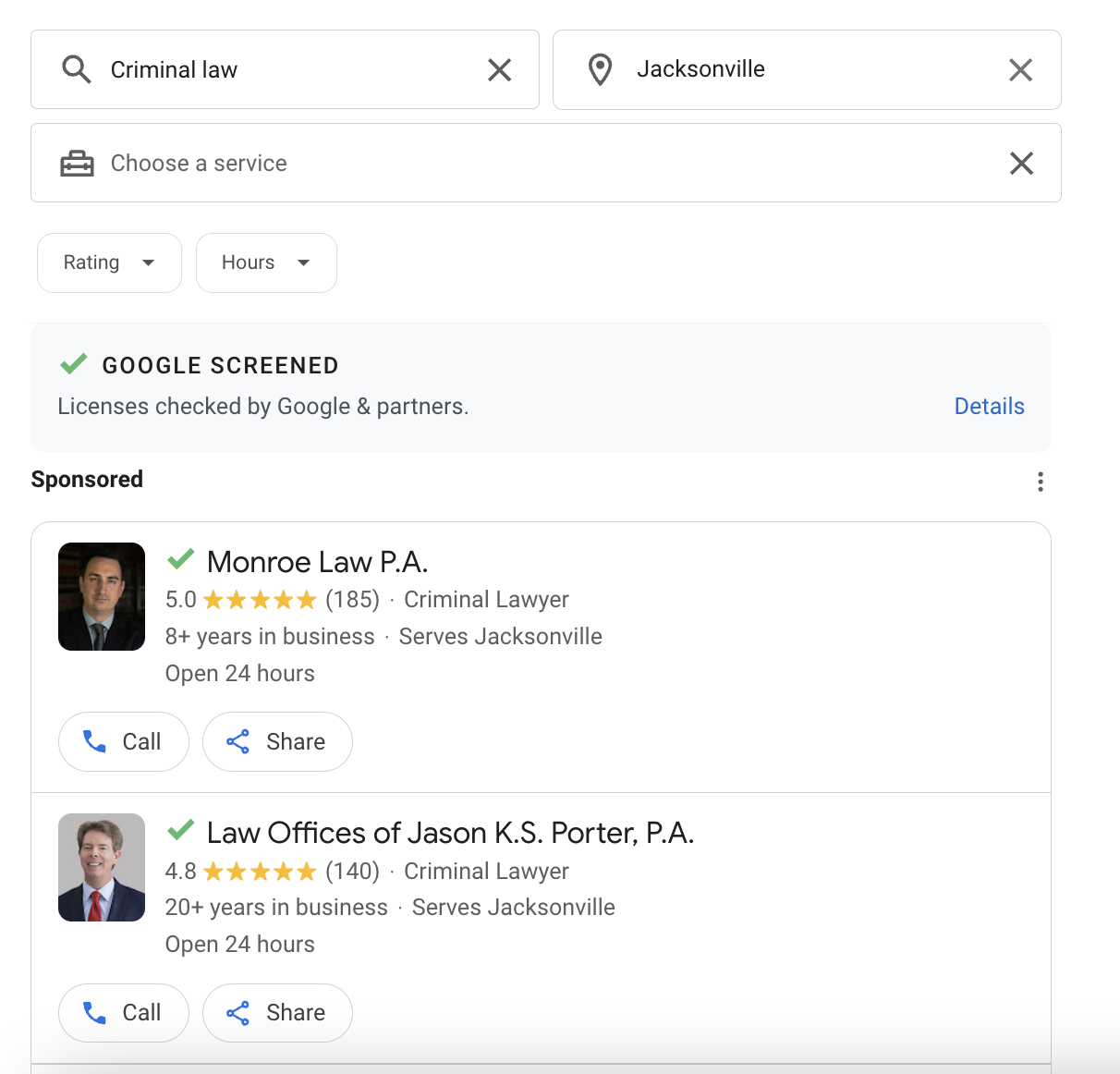
To set up LSAs, lawyers must go through a verification process to establish their business’s legitimacy and trustworthiness. Utilize Local Service Ads to boost your law firm’s online presence and attract more clients in your local area.
How to Create Successful Google Ads for Law Firm PPC
Understanding key PPC terms is essential for creating successful Google Ads campaigns for law firms.
Understanding the jargon: key terms in PPC advertising
Understanding the terminology involved in PPC for lawyers is crucial for making strategic decisions and guiding your law firm’s online presence.
Cost per click (CPC): The amount invested for each ad click.
Click-through rate (CTR): Percentage of users clicking on your ad after viewing it.
Cost-per-acquisition (CPA): Total cost to acquire a customer completing a specific action.
Return on ad spend (ROAS): Ratio of money gained or lost relative to PPC ad spending.
Quality Score: Ranks ads based on factors like keyword relevance.
Ad Rank: Your ad’s position in search results, influenced by bid amount, relevance, landing page experience, and ad extensions.
The Quality Score of your keywords, ads, and landing pages impacts your ad rank. Using tools like Google Analytics and WhatConverts helps track conversions and understand user actions, which is crucial for effective Google Ads for law firms.
Setting Up a PPC Campaign
Law firm PPC campaigns are a crucial step in creating a successful PPC advertising strategy for law firms. A well-planned campaign can help law firms reach their target audience, increase brand awareness, and drive qualified leads.
Creating a New Campaign and Choosing a Goal
To create a new Google Ads campaign, log in and click the “Campaigns” tab, then select “New Campaign.” Choose a campaign type (e.g., “Search” or “Display”) and set a goal like “Website Traffic” or “Conversions.” Aligning your goal with your law firm’s marketing strategy is crucial for measuring success. Remember, PPC costs vary as you only get pay per click for when someone clicks your ad.
Start with “Search” only
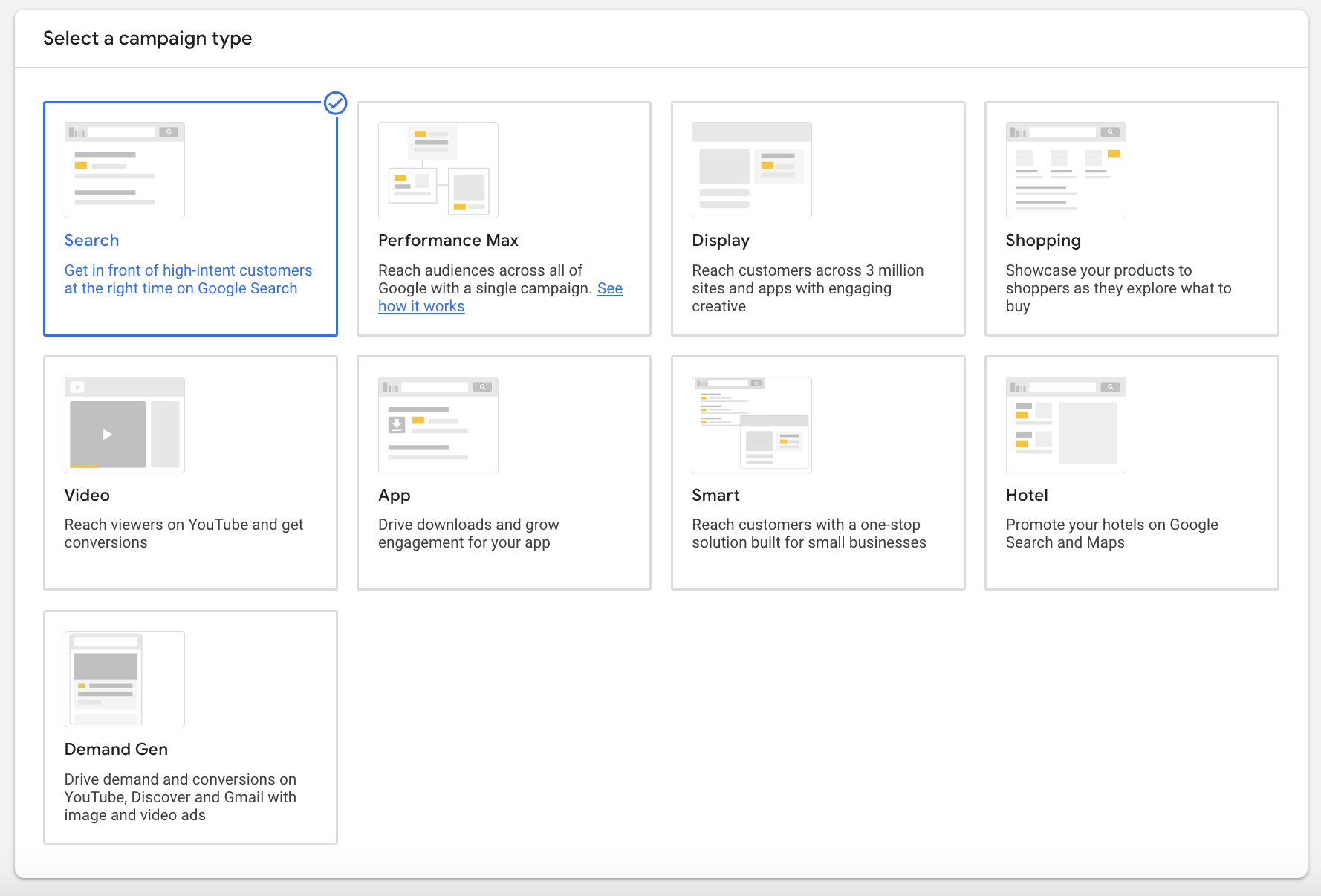
You will need to add your website and phone for the results you want to get.

By default, Google will check ‘Display Network’ for your search campaign, so you should uncheck it. Keep Google search partners checked if you want to appear on the local maps.
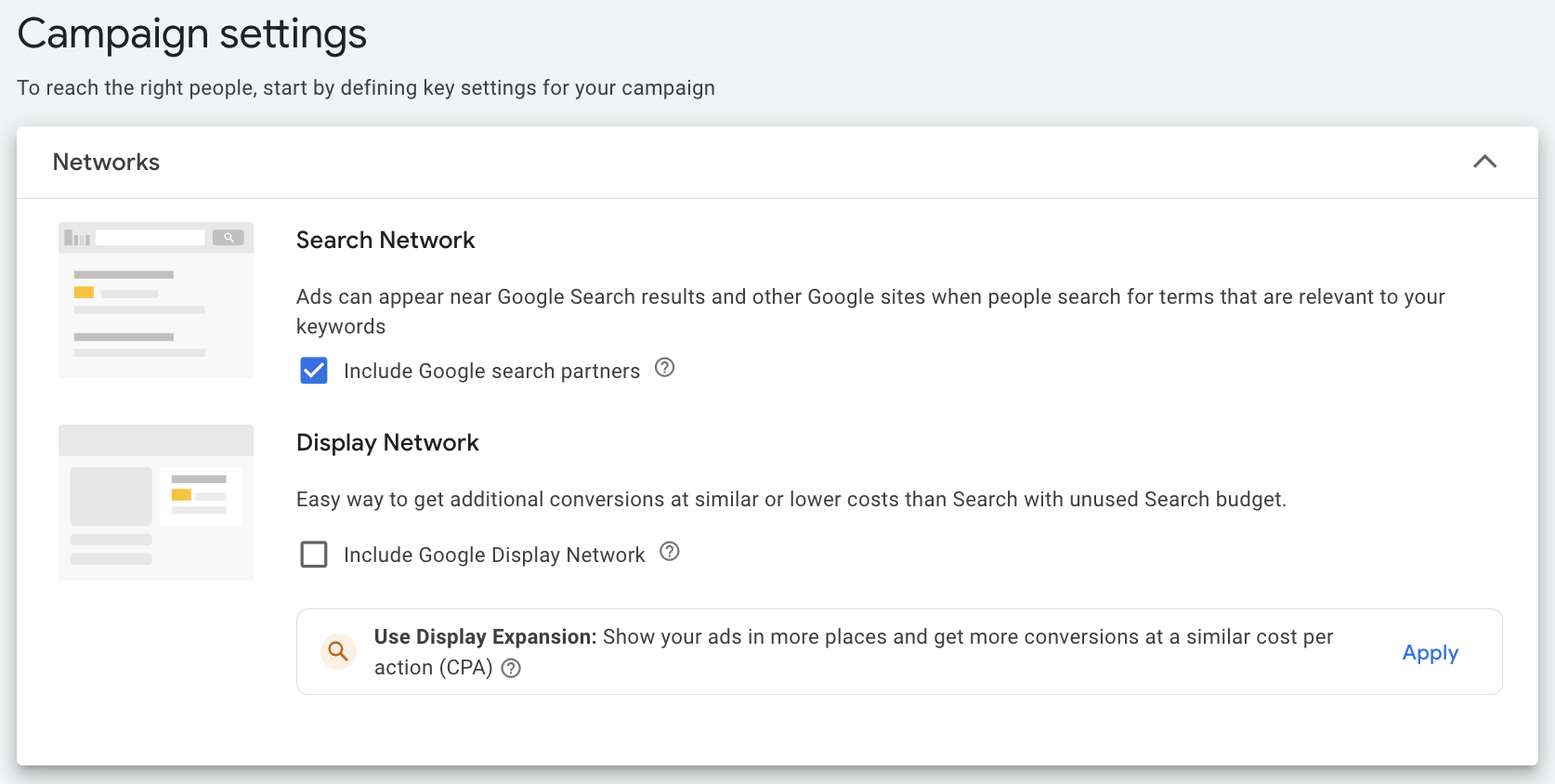
Targeting Potential Clients
Law firms must clearly define their ideal audience, focusing on specific demographics and interests, to effectively target potential clients. Google Ads offers various targeting options, such as location targeting to reach users in specific areas and language targeting to connect with speakers of particular languages. By utilizing these options, law firms can ensure their ads reach the right audience at the right time, thereby enhancing the effectiveness of their PPC campaigns.
Geographic targeting in PPC campaigns is crucial, as it ensures ads are shown only to users in locations relevant to the law firm’s services.
Keyword Research and Ad Group Planning
Keyword research and planning are essential components of a successful PPC campaign. Law firms need to identify keywords that their audience is searching for and create ad groups and ads that target those keywords. Using the Google Ads keyword planner helps in researching new keywords for PPC campaigns, providing insights into a user’s search query volume, competition, and potential performance.
Using the Google Ads Keyword Planner Tool
The Google Ads Keyword Planner Tool is a free resource for law firms to discover keywords, estimate search volume, and assess competition. To access it, log into your Google Ads account, navigate to the “Tools” tab, and select “Keyword Planner.”
Long-tail keywords attract leads that are more interested in specific legal services. The use of long-tail keywords, which are more specific phrases, in PPC advertising can yield higher conversions. Law firms should focus on long-tail keywords, which are more specific and less competitive. For example, instead of “lawyer,” use “personal injury lawyer in New York City” to attract qualified leads and lower costs per click.
Conduct thorough keyword research with the Google Ads Keyword Planner Tool to enhance your marketing efforts.
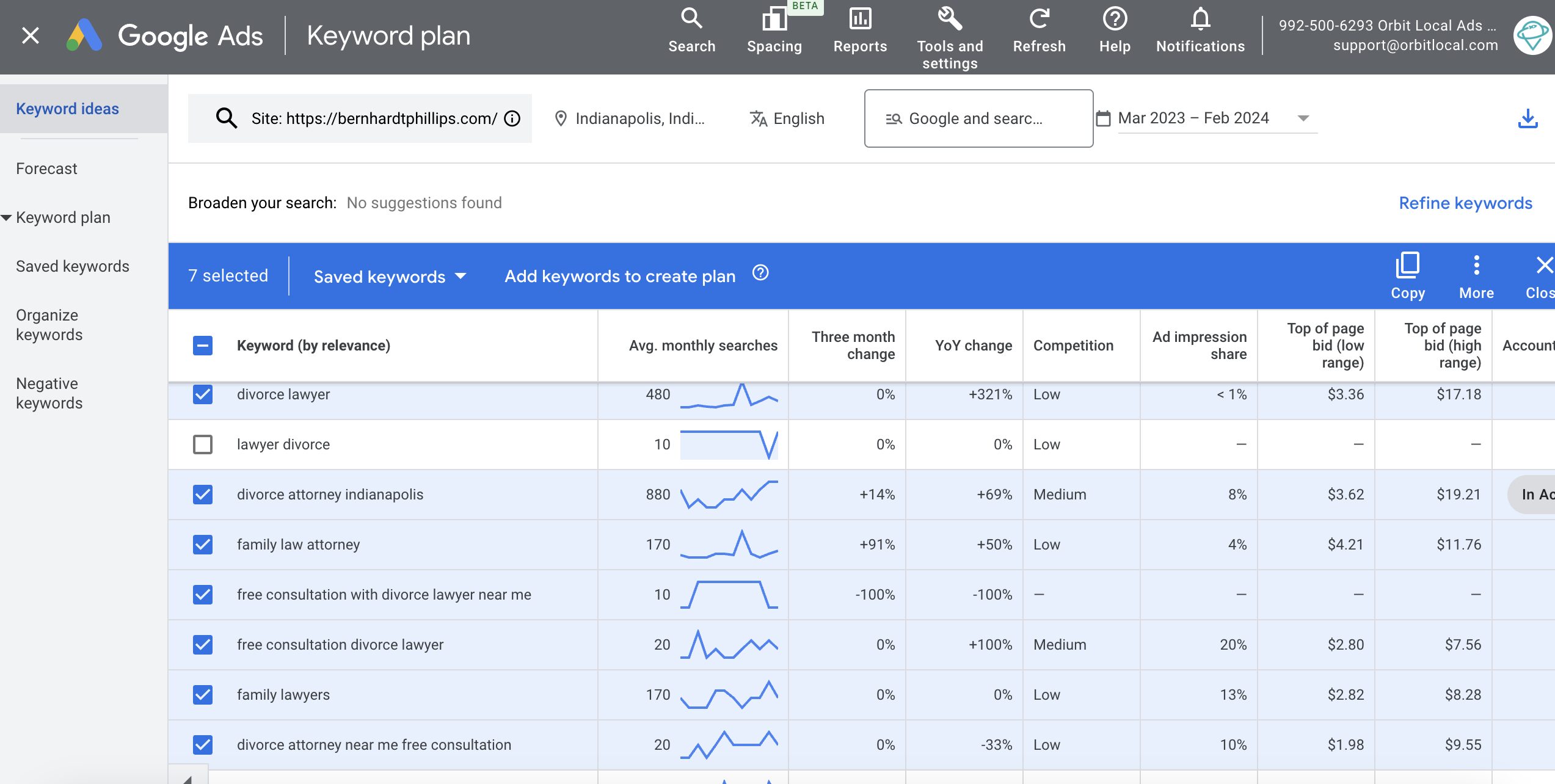
The next step is to create your search ads. Creating compelling, responsive search ads is crucial for any successful digital marketing campaign. These ads should be highly relevant to the content.
Ad Copy and Extensions
Writing Compelling Ad Copy
Creating compelling ad copy is like crafting a beacon that guides potential clients to your law firm in the vast digital cosmos.
To ensure your PPC advertising campaign shines brightly, follow these tips:
Clear Language: Use simple, direct language that resonates with your audience, avoiding jargon.
Relevant Keywords: Include keywords that align with your audience’s search queries to enhance visibility.
Compelling CTA: Use strong CTAs like “Get Your Free Consultation” to encourage action.
Social Proof: Add customer testimonials to build trust and credibility.
Unique Selling Proposition: Highlight what sets your law firm apart, such as experience or specialized services, to differentiate from competitors.
Google Ads allows for A/B testing of PPC ads to analyze which versions perform better in terms of conversions. By focusing on these elements, you can create ad copy that not only attracts attention but also drives meaningful engagement and conversions.
Using Ad Extensions to Boost CTR
Ad extensions are like adding extra thrusters to your PPC ads, propelling them to new heights and increasing their visibility. Here are some types of extensions that can enhance your PPC ads:
Site Link Extensions: Link to specific pages on your website, like contact or services pages, guiding users to relevant information.
Callout Extensions: Highlight features of your law firm, such as “Free Consultation” or “24/7 Support,” making your ad more appealing.
Call Extensions: Add a phone number for easy contact, especially for mobile users.
Review Extensions: Display customer reviews to build trust and credibility, encouraging users to choose your firm.
Ad extensions offer extra information to potential clients and boost your ad’s click-through rate (CTR), enhancing PPC campaign effectiveness. Aligning ad messaging with your website and using call-to-action phrases can further encourage user engagement.
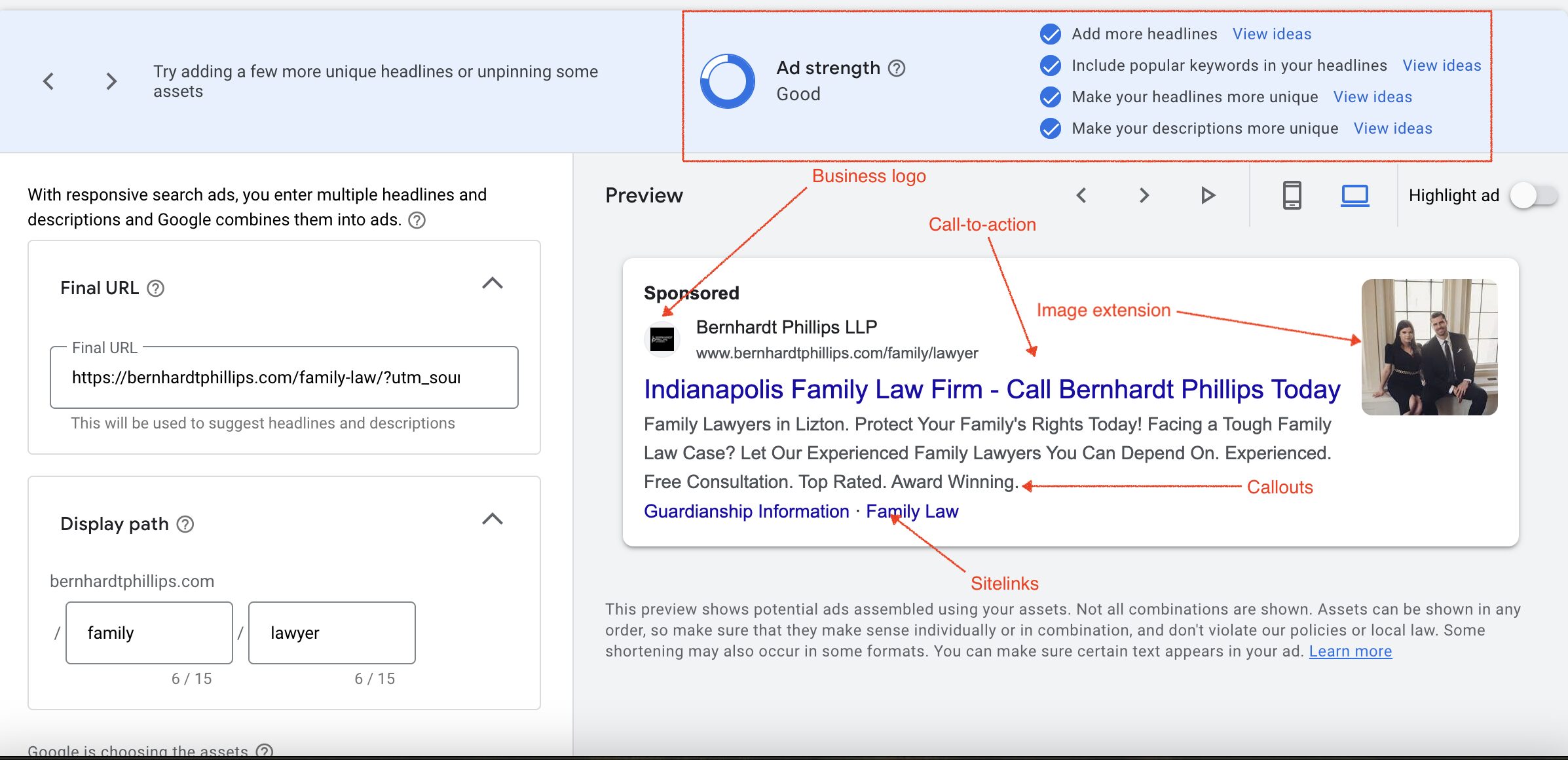
Focusing on mobile optimization for ads is crucial, as more users access websites via smartphones. Responsive search ads enhance audience reach and site traffic. Additionally, using keywords in your Google Ads for law firms can boost your Quality Score and ROI.
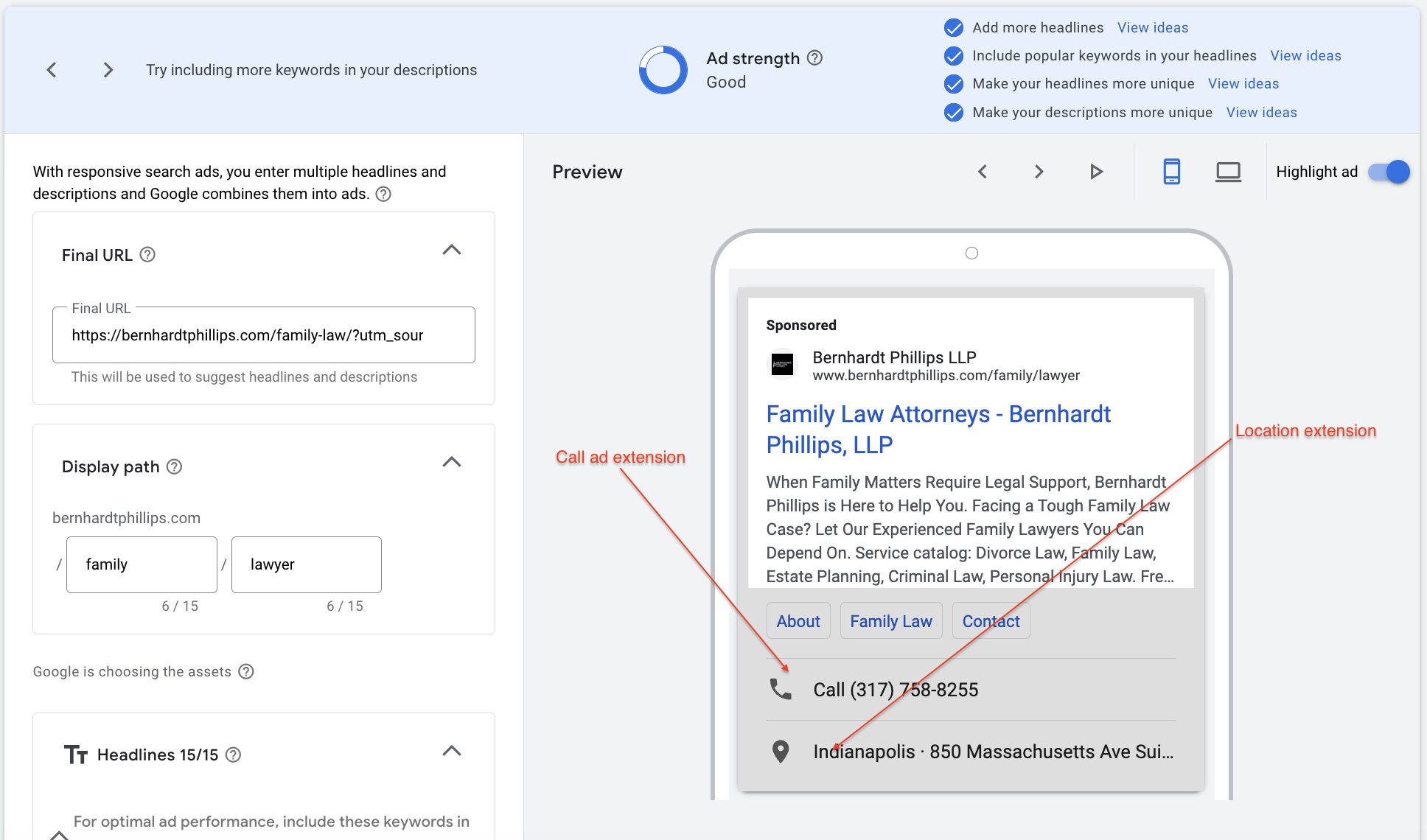
Boost your ads’ visibility and effectiveness with ad extensions like call or location extensions, leading to higher click-through rates (CTR). Keep an eye on your budget and bidding strategy for cost-effective advertising. Regularly analyze metrics to refine your approach based on data insights. Craft compelling, responsive, and mobile-friendly search ads to excel in digital advertising. By focusing on these elements, you can create campaigns that generate qualified leads, and grow your law firm.
PPC Budgeting and Cost Management in PPC Campaigns
Setting a PPC Budget
Budgeting for a PPC campaign can be tricky since you only pay when someone clicks your ad, leading to fluctuating monthly costs. Here are key tips for setting a PPC budget:
Determine Your Goals: Clearly define what you want to achieve, whether it’s increasing traffic, conversions, or brand awareness, to guide your budget.
Research Your Competition: Analyze competitors’ PPC spending to establish a benchmark for your budget.
Set a Daily Budget: You should set aside a realistic daily budget based on the average cost per click (CPC) for your targeted keywords.
Set a Total Budget: Establish an overall budget for the campaign to plan your ad spend effectively.
Monitor and Adjust: Regularly review your campaign performance and adjust your budget to optimize ROI.
Key factors to consider include:
Ad Spend: The cost per click, which varies with keyword competitiveness.
Cost per Conversion: The expense for each conversion, with lower costs improving ROI.
Return on Investment (ROI): A positive ROI indicates campaign success.
Conversion Rate: The percentage of users completing desired actions, with higher rates enhancing ROI.
By considering these elements and setting a realistic budget, you can ensure a successful PPC campaign that yields a positive return on investment.
Measuring Success and Optimizing
Tracking and Reporting
Tracking and reporting are crucial for successful PPC campaigns. Tools like Google Analytics allow lawyers to monitor key metrics such as website traffic, conversion rates, and ROI, helping identify areas for improvement. Setting up conversion tracking in Google Ads enables tracking of specific actions like form submissions and calls. Regular performance analysis through reporting tools allows for data-driven decisions, optimizing ad spend, and enhancing conversion rates. By refining strategies like keyword targeting and ad copy, lawyers can improve PPC effectiveness and drive more conversions, ultimately growing their practice.
Pro Tip: Use third-party lead tracking tools to measure lead quality and and revenue.
Use lead tracking for lead attribution
It’s important to track and analyze the performance of your SEO and PPC efforts to understand how they contribute to your overall growth. Using WhatConverts software can help you attribute leads from SEO, PPC, organic, and direct traffic and understand the customer journey that leads to conversions.
What is lead attribution?
Lead attribution involves determining which marketing channels receive credit for leads. This helps law firms track customer journeys and develop effective lead strategies. Different models include first-touch, last-touch, and multi-touch attributions.
Analyzing data optimizes marketing, improves resource allocation, and enhances lead generation by providing insights into campaign effectiveness for better ROI. Lead attribution is vital for understanding customer behavior and targeting the right audience, especially for law firms looking to expand and improve conversion rates through effective lead tracking.
Top Mistakes Law Firms Make
Lawyers must avoid common mistakes in PPC. Learn how to avoid these pitfalls and optimize your campaign for success.
Avoid targeting irrelevant keywords
Extensive keyword research is essential to identifying the most relevant and high-performing keywords for your law firm. Focus on long-tail keywords that are specific to your practice areas.
Carefully manage negative keywords
Ignoring irrelevant search terms can eat into your budget and harm your ad performance. Regularly review and update your negative keyword list to prevent your ads from appearing for irrelevant search queries.
Negative keywords help ensure ads only appear for relevant searches, filtering out irrelevant traffic. Using negative keywords in PPC campaigns helps filter out irrelevant traffic and increases ad relevance.
Don’t overlook the power of local targeting. Law firms typically serve clients in specific regions. Incorporate local keywords and utilize location targeting in your campaigns to reach clients in your desired areas.
In Google Ads, review the ‘Search Terms‘ report to find irrelevant keywords that’s eating up your budget.
For example, if you don’t have a Spanish-speaking lawyer at your law firm, then you might want to exclude Spanish terms. Additionally, you’ll want to exclude your competitors brand searches.
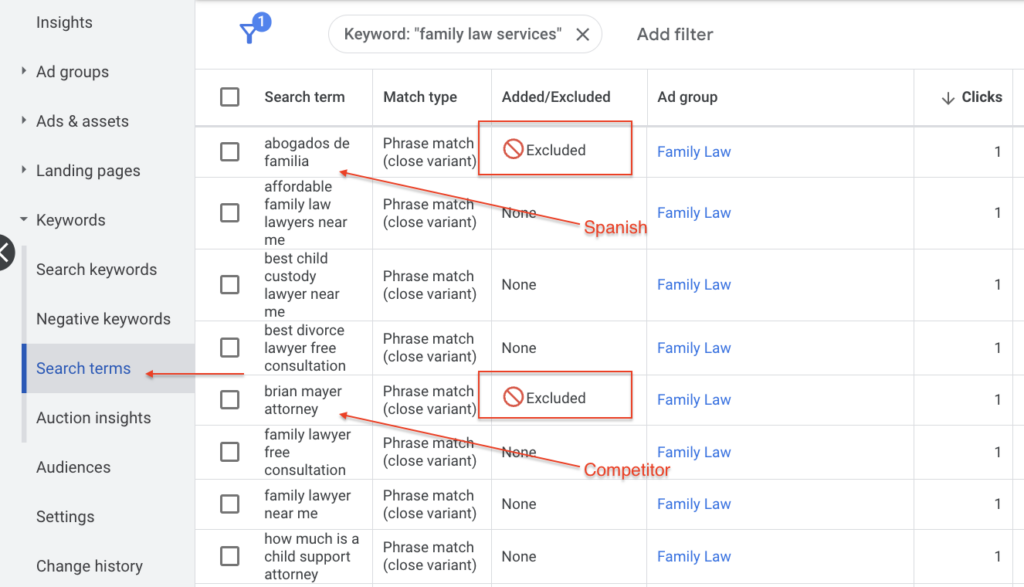
Avoiding Competitor Keywords
Law firms should steer clear of targeting competitor keywords in their PPC campaigns due to high competition and low returns. Instead, focus on keywords directly related to your practice areas and client needs to attract quality leads efficiently.
Bidding on Relevant Keywords
Avoid bidding on irrelevant keywords to prevent wasting your PPC budget. Conduct thorough keyword research, blend high- and low-volume keywords, and continuously monitor performance to optimize ROI and draw in quality leads.
Effective Location Targeting
Mismanagement of location targeting can lead to wasted budgets from clicks outside your service area. Strategically select ad locations and set a realistic daily budget based on average CPC. Utilize geotargeting to ensure your ads reach potential clients in your target area.
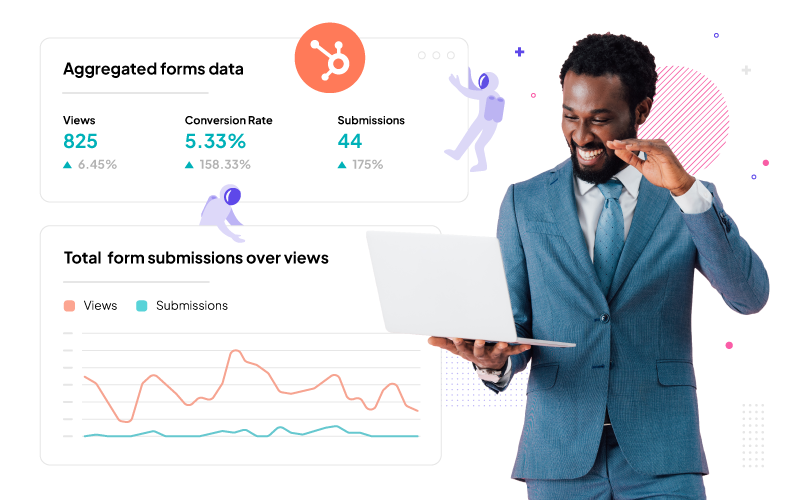
Not integrating your ad campaigns with a CRM
Many law firms overlook the importance of integrating ad campaigns with a CRM system like Clio Legal CRM or HubSpot CRM. This integration allows for tracking leads from ads, providing valuable insights into campaign effectiveness and helping convert leads into paying clients.
Setting and forgetting PPC Management
Neglecting PPC management can result in missed opportunities for valuable leads. Regularly monitoring and optimizing PPC campaigns is crucial for driving traffic and increasing conversions. PPC is a vital component of a law firm’s digital marketing strategy to attract quality leads.
Not having dedicated landing pages
Lacking dedicated landing pages can lead to low conversion rates and wasted ad spend. Law firms should create content that aligns with their ads and addresses user needs to enhance campaign effectiveness. Use builders like Clio, HubSpot, or Unbounce for responsive design.
Clio’s builder
Using Clio’s builder for law firms allows you to create targeted, engaging, and professional-looking pages that can significantly enhance your online presence and client acquisition efforts.
Here’s a step-by-step example of how you might use Clio’s builder to create a page for a law firm:
Step 1: Define Your Objective
First, determine the goal of your page. For a law firm, this might be to generate leads for a specific area of practice, like family and personal injury law firm, or a personal injury law firm.
Step 2: Choose a Template
Clio’s builder likely offers a variety of templates tailored to different goals and types of content. Choose a template that aligns with your objective and the image of your law firm.
Step 3: Customize Your Content
Headline: Craft a compelling headline that clearly states the value proposition, like “Experienced Family Law Attorneys Ready to Assist You.”
Subheadline: Provide a supporting statement that elaborates on the headline, such as “Compassionate and Comprehensive Legal Support for Your Family.”
Images: Use high-quality, relevant images. For a law firm, this could be a professional photo of the attorneys or the office.
Body Content: Include persuasive content that outlines your services, your attorneys’ expertise, and testimonials from satisfied clients.
Call to Action (CTA): The CTA should be prominent and clear, such as “Schedule a Free Consultation” or “Contact Us Today for Expert Legal Advice.”
Step 4: Integrate Forms
Use Clio’s builder to integrate a contact form directly on the page. Ensure it’s simple and only asks for essential information, like name, email, and case type.
Step 5: Ensure Mobile Responsiveness
With Clio’s builder, your page should be mobile-responsive. However, always check how the page looks on various devices to ensure the user experience is seamless across all platforms.
Step 6: SEO Optimization
Include relevant keywords in your content, meta titles, and descriptions to improve the page’s visibility in search engine results.
Step 7: Publish and Test
Once your page is ready, publish it. Then, conduct A/B testing with different elements (like headlines or CTAs) to see what resonates best with your target audience and drives conversions.
Step 8: Analyze and Optimize
Use analytics tools to track the performance of your page. Monitor metrics like traffic, bounce rate, and conversion rate to understand how visitors interact with the page and to identify areas for improvement.
By following these steps and utilizing Clio’s builder, a law firm can create a powerful online tool that not only reflects the firm’s professionalism but also effectively attracts and converts paying clients.
HubSpot’s builder
Using HubSpot’s builder, a law firm can create an effective page that not only showcases its expertise and services but also is designed to convert visitors into paying clients.
Here’s a step-by-step example of how a law firm might use HubSpot:
Step 1: Set Your Objective
First, define what you want to achieve with your page. For a law firm, the goal might be to collect leads for a particular service area, such as real estate law or corporate litigation.
Step 2: Choose a Template
HubSpot provides a variety of customizable templates. Select one that aligns with your law firm’s brand image and the objective of your content. Opt for a design that is professional, clean, and tailored to the legal industry.
Step 3: Customize Your Page
Headline: Write a compelling headline that clearly states what you offer, like “Expert Real Estate Legal Services.”
Subheadline: A subheadline can provide more context or detail, such as “Protecting Your Real Estate Investments with Proven Expertise.”
Images: Add professional images that relate to your legal practice. This could be photos of your team, your office, or imagery that resonates with your area of law.
Content: Draft concise, persuasive content outlining your services, your team’s experience, success stories, and client testimonials. Use bullet points or short paragraphs for easy readability.
Call-to-Action (CTA): Your CTA should be clear and action-oriented, like “Schedule a Free Consultation” or “Download Our Free Guide to Real Estate Law.”
Step 4: Integrate Lead Capture Forms
Incorporate a form to capture visitor information. Keep it simple – request only essential details such as name, email, and perhaps an area of interest regarding legal services.
Step 5: Ensure Mobile Responsiveness
HubSpot’s page builders are designed to be mobile-responsive, but you should still preview and test your page on various devices to ensure the layout and elements adapt well and provide a good user experience.
Step 6: SEO Optimization
Utilize SEO best practices by incorporating keywords related to your legal services, ensuring your page title, headers, and content are optimized for search engines. This helps your page rank higher in search results.
Step 7: Test and Publish
Before making your page live, test all the elements, including the loading speed, form submissions, and CTAs, to ensure everything works flawlessly. Then, publish your page.
Step 8: Analyze and Adjust
After your landing page now is live, use HubSpot’s analytics tools to track its performance. Monitor metrics such as page views, conversion rates, and bounce rates. Use these insights to make data-driven adjustments to optimize your landing page optimization, for better results.
By leveraging HubSpot’s page builder, a law firm can craft content that not only reflects its professionalism and expertise but also strategically engages visitors, encouraging them to take the next step in their legal journey with the firm.
Unbounce’s builder
Using Unbounce’s builder, law firms can create effective and engaging landing pages that cater specifically to their audience, emphasizing their legal expertise and services.
Here’s a step-by-step example of how a law firm might use Unbounce to develop a page:
Step 1: Define Your Goal
Determine the primary objective of your page. For a law firm, this might be to gather leads for a particular legal service, such as estate planning or criminal defense.
Step 2: Select a Template
Unbounce offers a variety of templates. Choose one that aligns with your firm’s branding and the specific goal of your page. Ensure the template is professional and relevant to the legal industry.
Step 3: Customize the Template
Headline: Create a compelling headline that immediately communicates your value proposition, such as “Expert Legal Representation in Estate Planning.”
Subheadline: Provide a subheadline that offers additional details or emphasizes your unique selling points, like “Tailored Solutions for Your Peace of Mind.”
Images: Include professional images or graphics. For a law firm, consider images of your team, your office, or legal-related imagery that conveys trust and professionalism.
Content: Write concise, persuasive content that highlights your services, your team’s qualifications, client testimonials, and any awards or recognitions. The content should be structured in an easy-to-read format.
Call-to-Action (CTA): Your CTA should be clear and compelling, encouraging visitors to take action, such as “Book Your Free Consultation” or “Contact Us Today for Expert Advice.”
Step 4: Optimize Forms
Incorporate a contact form that is straightforward and not overly intrusive. Ask for essential information like name, email, phone number, and a brief description of the legal issue.
Step 5: Mobile Responsiveness
Unbounce templates are mobile-responsive, but it’s crucial to test and ensure that the landing page looks great and functions well on various devices, providing a seamless experience for mobile users.
Step 6: SEO and Keywords
Landing page optimization for search engines includes keywords that clients might use to find legal services in your specialty area. Ensure these are naturally integrated into your content, titles, and meta descriptions.
Step 7: Testing and Publishing
Before going live, test your page to ensure all elements work correctly, including links, forms, and responsiveness. Once satisfied, publish it.
Step 8: Monitor and Optimize
Utilize Unbounce’s tools or integrate with analytics to track performance metrics such as conversion rate and visitor behavior. This helps law firms create effective landing pages that highlight their services and improve visitor-to-client conversion rates.
Law Firm Branding
Law firms require a strong online presence, and effective branding is crucial. PPC marketing can enhance visibility on various social media platforms and display networks. Morgan & Morgan exemplifies successful legal marketing on platforms like YouTube and Instagram. By sharing informative content and client testimonials, firms can build credibility and trust, using engaging features like reels and shorts to connect with potential clients.
Exploring the Metaverse can also provide a competitive edge, offering immersive experiences for virtual meetings and consultations. Additionally, incorporating traditional media like radio advertising can broaden audience reach.
By adopting a multi-platform branding strategy, inspired by successful firms like Morgan & Morgan, law firms can effectively showcase their services and differentiate themselves in a competitive market.
Synergizing SEO and Law Firm PPC Strategies: A Galactic Power Duo
SEO for Lawyers is a strategic method to build a strong online presence and attract clients seeking legal services. By integrating SEO with PPC advertising, law firms can boost visibility, attract quality leads, and promote growth. SEO enhances organic search rankings, while PPC delivers immediate visibility through targeted ads at the top of search results.
The Organic Orbit of SEO
SEO focuses on building your website’s organic visibility over time. This involves:
Keyword Optimization: Identifying and incorporating keywords into your website content to match what clients are searching for.
High-Quality Content: Creating valuable, informative content that addresses the needs and questions of your audience.
Technical SEO: Ensuring your website is technically sound, with fast load times, mobile optimization, and secure connections (HTTPS).
Backlink Building: Earning backlinks from reputable websites to boost your site’s authority and search engine rankings.
By optimizing your website with these best practices, you can increase your organic search visibility and attract more clients naturally.
The Immediate Impact of PPC Marketing
While SEO builds your organic presence, PPC ads offers immediate visibility. Running PPC campaigns targeting specific keywords related to your legal services can help you reach potential clients right away. This involves:
Keyword Bidding: Bidding on high-value keywords to ensure your ads appear in the prime spots on search engine results pages.
Targeted Ads: Crafting compelling ads that attract clicks from your desired audience.
Budget Management: Setting and adjusting your budget to maximize ROI, ensuring effective use of your advertising spend.
Analytics and Optimization: Monitoring ad performance and making data-driven adjustments to improve effectiveness.
The Synergy of SEO and PPC Ads
When combined effectively, SEO and PPC ads can complement each other by targeting both organic and paid search traffic:
Comprehensive Coverage: By appearing in both organic and paid search results, your firm can dominate the search engine landscape, increasing overall visibility.
Data-Driven Insights: PPC ad campaigns data can provide valuable insights into which keywords and ad copy perform best, informing your SEO strategy.
Increased Credibility: A strong presence in both organic and paid results can enhance your firm’s credibility and trustworthiness in the eyes of potential clients.
Reaching for the Stars
By leveraging the strengths of both SEO and PPC, your law firm can achieve stellar online visibility, attract high-quality leads, and foster growth. This dual approach ensures that your law firm’s ppc name is visible to potential clients at every stage of their search journey, propelling your practice to new heights in the digital galaxy.
Conclusion: Launching Your Law Firm PPC to New Heights
In conclusion, mastering PPC for lawyers is vital for enhancing online visibility and attracting new clients. PPC campaigns provide benefits like targeted reach and measurable results. Understanding ad types and platforms, along with implementing effective strategies and SEO practices, will strengthen your law firm’s online presence and reputation, helping it stand out in the digital landscape.
If you’re interested in using Orbit Local PPC services, please book a call today
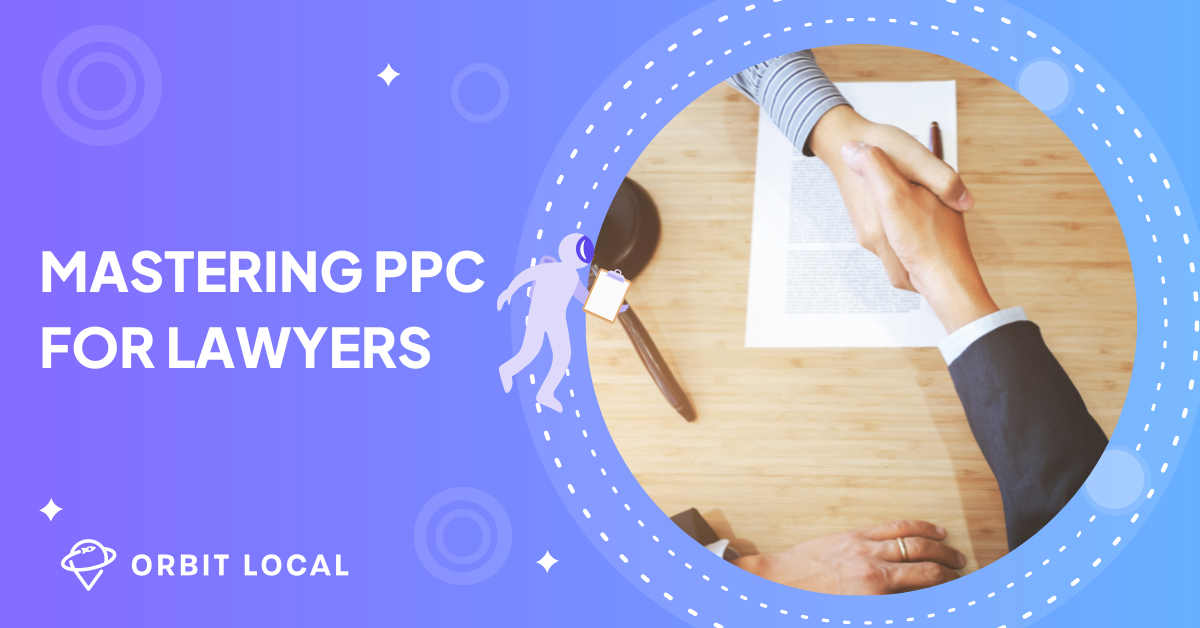

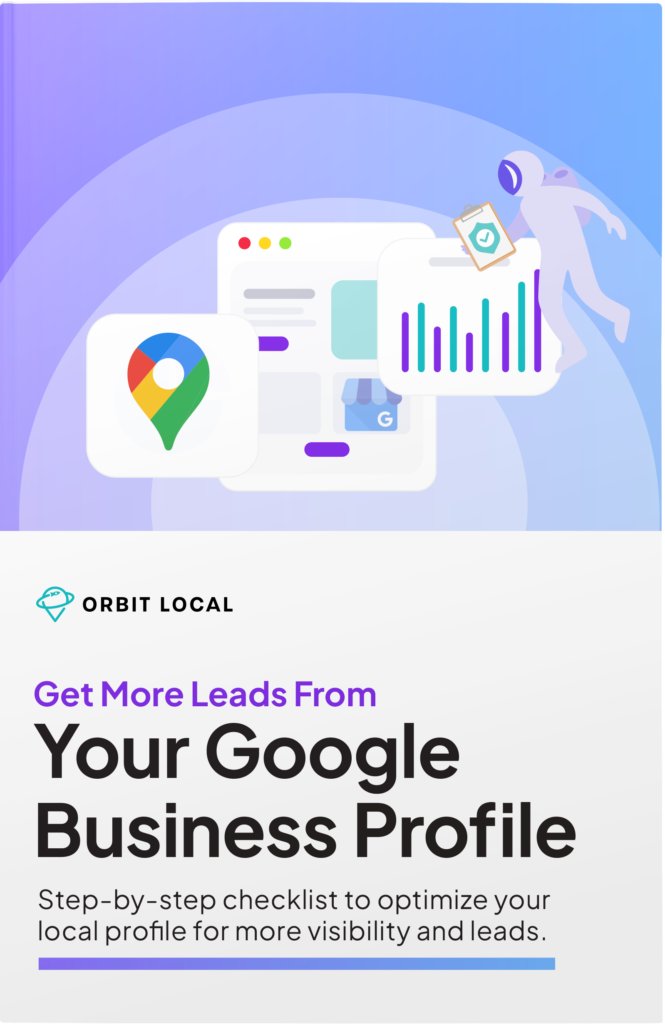

Hey there!
Just finished reading your article on PPC for lawyers over at Orbitlocal, and I must say, I found it incredibly insightful and timely. I appreciated how you highlighted the importance of targeting the right keywords in the legal niche. It’s clear that finding those highly relevant keywords can make all the difference in the success of a PPC campaign. Your tips on crafting compelling ad copy were spot on too. It’s reassuring to know that even in the competitive world of law, creativity and a well-crafted message can set you apart.
Thank you so much for your thoughtful comment! I’m thrilled to hear that you found the article insightful and timely. Targeting the right keywords is indeed crucial in the legal niche, and I’m glad you appreciated the emphasis on that. Crafting compelling ad copy can certainly make a significant difference, and it’s great to know that the tips resonated with you. If you have any questions or need further advice, feel free to reach out. Thanks again for your feedback and support!